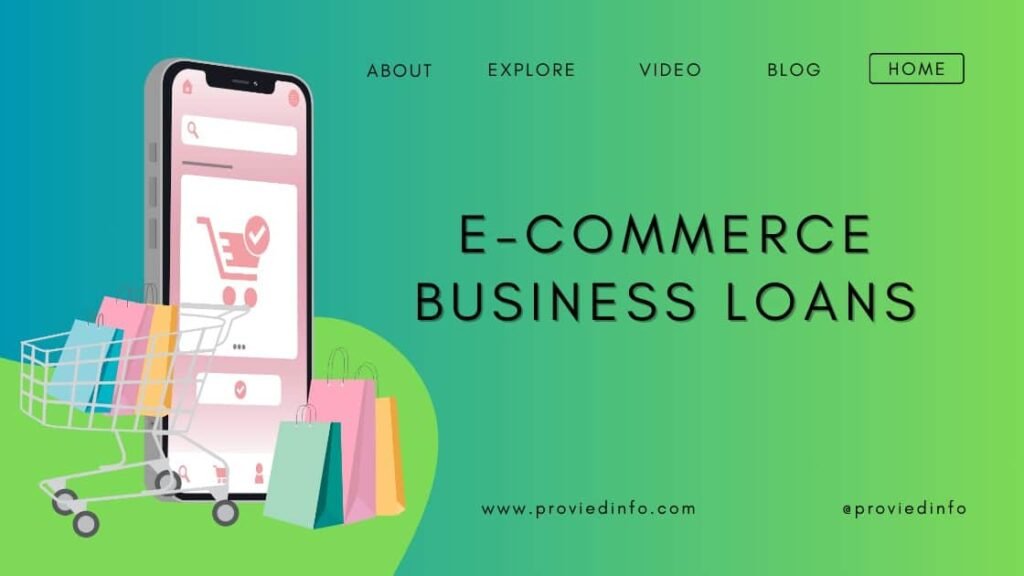Ever wondered how to finance your e-commerce dreams? E-Commerce Business Loans isthe solution to your question. Finding the correct money is crucial, and this is true whether you wish to sell more online, introduce additional products or reach more people.
We will explain the many kinds of loans for e-commerce enterprises, their conditions and how to pick the best loan. You’ll have the knowledge and confidence to navigate e-commerce banking and grow your online company.

E-Commerce Business LoansWhat are E-Commerce Business Loans?
E-Commerce Business Loans are financial products tailored to meet the specific needs of online retailers. E-commerce enterprises may use these loans for inventory management, website development, marketing and growth.
To match the dynamic nature of online shopping, e-commerce loans frequently have more flexible terms, quicker approval timeframes, and easier repayment options than traditional loans. The lender needs, and borrower creditworthiness dictate secured versus unsecured loans.
Types of Ecommerce Business Loans

Types of Ecommerce Business Loans- Traditional Term Loans: Traditional term loans are a standard method for companies to receive funding. This loan gives you a lump sum and requires you to repay it at specified interest rates.
- Merchant Cash Advance: Online merchant cash advances (MCAs) allow enterprises to prepay for future purchases. Your credit card issuer will deduct a portion of your daily sales until you refund the amount and any fees and this is done for a single payment.
- Invoice Financing: When an e-commerce company needs cash, it might employ invoice financing or accounts receivable funding. This loan depends on your bill balance and the lender will pay a portion of the invoice beforehand.
- Equipment Financing: E-commerce companies may utilize equipment finance designed for this industry to upgrade essential equipment. Equipment loans let you pay for these expenditures over time and enable you to pay for these goods over time.
How to Qualify for Ecommerce Business Loans
Before getting a loan for an e-commerce company, one must be prepared and consider many things. Here are some crucial steps to increase your acceptance chances:

How to Qualify for Ecommerce Business Loans- Maintain a Good Credit Score: Lenders weigh your credit score heavily when deciding to lend you money, one of the most significant factors that lenders consider. A strong credit score increases your chances of repaying a debt. Higher scores may get you better loan rates, but always aim for 650 or higher.
- Provide Detailed Financial Statements: Lenders must assess your finances to see whether you can repay your obligations. You must give detailed financial documents. Profit and loss statements, balance sheets, and cash flow predictions should be included, as these papers are informative.
- Offer Collateral for Secured Loans: The lender reduces risk if the borrower doesn’t repay the loan by requiring collateral. Property, business, tools and outstanding bills may be utilized as security. If you can’t repay the loan, give the lender significant collateral to reassure them.
- Build a Solid Business Plan: E-Commerce Business Loans should contain objectives, techniques, market research and financial projections. Your business plan will show lenders how well you know your sector, what market opportunities exist and how much space you must develop.
Pros and Cons of Ecommerce Business Loans
Pros:
1. Flexible Usage: E-commerce loans provide companies with the flexibility to spend money. These loans allow you the financial independence to address many company demands and needs.
2. Quick Access: Loans for e-commerce enterprises are outstanding since they may be authorized and financed rapidly. Ecommerce Business Loans are generally accessible, and some lenders offer money on the same day.
3. Business Growth: A great benefit of e-commerce company loans is that they may help enterprises expand and become self-sufficient. This may be the most crucial loan advantage, and fast funding may help you execute your expansion strategy.
Cons:
1. High Interest Rates: E-commerce loans may have higher interest rates. E-commerce enterprises are riskier, and thus, financing rates are higher. This applies particularly to organizations with little security or credit history.
2. Risk of Debt: Ecommerce Business Loans have the same hazards as regular borrowing if done incorrectly. If you can’t make your loan payments, you might lose money, your credit score and your business’s future.
3.Potential Collateral Requirement: To protect e-commerce loans, collateral may be required. Your assets may be seized if you can’t repay a collateralized loan and the scenario above occurs even if these loans have lower interest rates.
Tips for Choosing the Right Ecommerce Business Loans
- Assess Your Business Needs Thoroughly: Before requesting loan finance, thoroughly assess your successful e-commerce business’s financial requirements and ambitions. It might help you purchase items, promote, expand your company or manage cash flow.
- Compare Interest Rates and Terms from Multiple Lenders: Don’t accept the first loan offer, no matter how many you receive. Compare loan fees, interest rates, and terms to obtain the best deal. Other lenders specializing in online company funding should be considered alongside conventional banks.
- Consider the Loan’s Impact on Cash Flow: Consider loan payments to make the most significant cash flow decisions for your e-commerce company. You need to compare the monthly loan payments to your predicted income to determine whether you can repay the loan without wasting your savings.
Application Process for Ecommerce Business Loans

Application Process for Ecommerce Business Loans1. Research Lenders: Consider lenders that specialize in online business credit possibilities. Find lenders who have dealt with online businesses and provide reasonable financing alternatives. Remember these when searching for dependable lenders to assist your company realize financial objectives.
2. Gather Documents: Before applying for a loan, be sure you have everything lenders need to assess your credit risk and company viability. The investor may then determine whether you qualify for the loan and many forms of financial documents fall under this category.
3. Undergo Evaluation: After you apply for a loan, the lender will evaluate your reputation and company profitability. To assess the risk of lending money to your e-commerce company, your credit history, financial records, business strategy, and other relevant documents may be examined.
4. Receive Approval: The lender submitted loan terms and conditions in the offer letter. If the lender approves your loan, read these terms and conditions carefully. Pay particular attention to fees, interest rates, repayment periods, and other limitations that may influence user obligations.
Alternatives to Ecommerce Business Loans
- Bootstrapping: Savings, sales, or reinvested earnings fund your e-commerce company. This shows the initial procedure. Since self-funding doesn’t need debt or modify your company equity, you may maintain complete control over your organization.
- Crowdfunding: Online shops may acquire funds from many supporters on crowdfunding sites and this is usually done via stock crowdfunding or rewards-based crowdfunding marketing.
- Partnerships: Strategic relationships with other firms provide e-commerce enterprises access to pooled resources, expertise, and networks. Working with comparable companies may help your company get exposure and attract new customers.
Conclusion
E-Commerce Business Loans help internet enterprises succeed in the digital market. These loans provide open use, rapid access and unique solutions to enable e-commerce enterprises to take risks, solve challenges and develop.
You can assist them in making informed decisions that meet their company and financial objectives. Whether you’re an established online shop owner looking to develop or a new one starting, having the money you need may be the key to success.
FAQs:
What are the typical interest rates for e-commerce business loans?
The interest rate depends on the borrower’s credit score, loan amount, and repayment method. Interest rates typically range from 6% to 30%.
How long does it take to receive funding for an e-commerce business loan?
Collecting the money might take days or weeks, depending on approval time and loan documentation. Investors select how long it takes to collect their money.
Can e-commerce business loans be used to cover operating expenses?
E-commerce loans may be used to acquire products, launch marketing campaigns, improve websites and cover company expenses.
What happens if I default on an e-commerce business loan?
Unpaid loans may harm your credit score, the lender may attempt to get the money back, and even judicial action may be initiated to recover unpaid invoices.
Are there any prepayment penalties associated with e-commerce business loans?
Some lenders charge extra for early loan repayment. Before accepting a loan package, be sure you understand its terms.